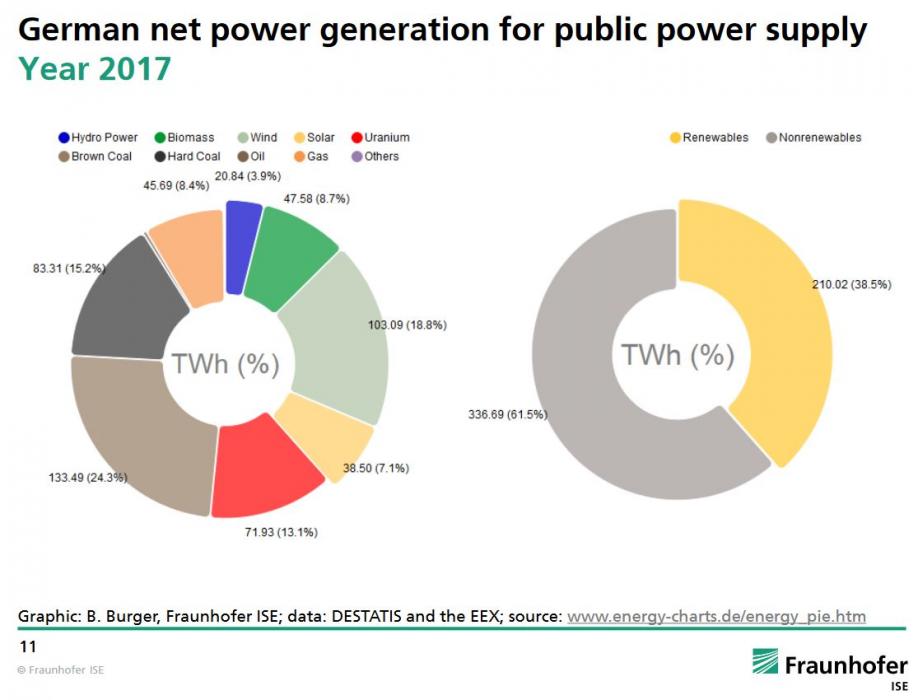Grid costs likely topic at coalition talks / innogy seeks savings
Handelsblatt
Germany’s soaring grid costs and negative power prices will likely be tackled during the talks between Chancellor Angela Merkel’s conservatives and the Social Democrats (SPD) on renewing their grand coalition, reports Klaus Stratmann in Handelsblatt. “We can’t afford this lunacy in the long run. The upcoming government coalition will have to deal with this issue,” said Bernd Westphal, the SPD’s energy policy spokesperson. The conservatives’ energy policy coordinator, Thomas Bareiß, told Handelsblatt that the increasing gap between energy supply and demand will endanger Germany’s supply security and the competitiveness of its industry.
Read the article in German (behind paywall) here.
For background, read the factsheets Why power prices turn negative and Set-up and challenges of Germany’s power grid.
innogy / Reuters
After the sudden departure of CEO Peter Terium, German utility innogy is “reviewing discretionary spending across all segments”, the company says in a press release. The spin-off of energy company RWE says it “reiterates its financial discipline targets”, and will focus its investments on “core activities in the renewables, grid & infrastructure and retail segments”.
In a separate article, news agency Reuters says innogy and RWE shares “took a beating” in December 2017 after the group projected a drop in 2018 earnings. Former CEO Terium left the company a few days after the negative forecast was published.
See the press release in English here, and the Reuters article in English here.
Read the CLEW factsheet Germany’s largest utilities at a glance for more information.
Frankfurter Allgemeine Zeitung
The “arrogance” of German utility innogy in late 2017 has given way to a “newfound modesty” at the beginning of 2018, Helmut Bünder writes in a commentary for the Frankfurter Allgemeine Zeitung. The company’s announcement of a cost-cutting action across the board in 2018 “demonstrates just how much innogy has unsettled the capital market with its misleading communication and audacious growth strategy”, Bünder says. The spin-off of utility RWE “urgently has to build new trust with investors”, which is why dividend payouts now gain in importance vis-à-vis investment in future capacities, he writes.
See the CLEW dossier Utilities and the energy transition for background.
German utility RWE has reorganised its power generation business by spinning off its lignite and nuclear power operations into a separate company, the company says in a press release. The move was intended to “make our electricity generation companies more flexible, while aligning them more closely to their respective energy sources”, RWE CEO Rolf Martin Schmitz says. The utility’s gas, hard coal, hydroelectric power, and biomass generation businesses will now be pooled within RWE Generation, while RWE Power will run the company’s lignite-fired generation and manage nuclear energy, according to the press release.
Find the press release in English here.
See the CLEW dossier Utilities and the energy transition for background.
Frankfurter Allgemeine Zeitung
Germany’s domestic transport market is set to change substantially in 2018 as bus companies, railway services, and airlines seek to woo people away from using passenger cars, Timo Kotowski writes in the Frankfurter Allgemeine Zeitung. About 80 percent of all journeys in Germany are currently made with passenger cars, but especially national railway company Deutsche Bahn could gain additional passengers “if it manages to improve its quality and punctuality”, Joris D’Incà, transportation consultant at Oliver Wyman, says. D’Incà argues that passengers will choose trains over airplanes or cars if travel time, rather than ticket prices, is reduced.
See the CLEW factsheet Energiewende in transportation for more information.
Fraunhofer ISE
In 2017, renewables represented a record of around 38.5 percent of public net power generation (33.8 percent in 2016), writes Bruno Burger of Fraunhofer ISE in an end-of-year assessment. In total, renewables contributed 15 percent more to Germany’s public electricity supply in 2017 than in the previous year, according to the preliminary data. Germany’s power export surplus was around 50 terawatt hours (TWh), equal to 2016 levels. The term ‘public net generation’ refers to electricity fed into the public power grid. It does not include the losses that occur within the power plants, and the self-generation of electricity in industry. The German government’s targets are measured in gross power generation and consumption. Data on net electricity generation and total gross electricity generation differ significantly, which also results in significantly different shares of renewable energies.
Find the assessment in English here.
Also read CLEW’s factsheets on Germany’s energy transition targets and the country’s power mix in charts.
Frankfurter Rundschau
In a “decisive year” 2018, the next German government must determine the course for the country’s exit from coal-fired power generation, and deal with the looming failure to reach its 2020 greenhouse gas reduction target, writes Frank-Thomas Wenzel in the Frankfurter Rundschau. However, resistance from IG BCE, the trade union for mining, chemicals and energy industries, and politicians in Germany’s coal regions will make the “struggle over coal” rather difficult, writes Wenzel.
Read the article in German here.
For background, read the CLEW article Germany set to widely miss climate targets, env ministry warns and the factsheets When will Germany finally ditch coal? and Coal in Germany.
Die Welt
Germany’s federal armed forces are among the critics of the Russian-German natural gas pipeline project Nord Stream 2, and call for the pipeline to be built along a different route than planned, writes Alan Posener in Die Welt. According to current plans, the new pipeline would run next to the existing Nord Stream pipeline, which crosses a military training area. Posener’s article also lists the project’s “powerful friends” and critics, and lays out the arguments for and against it.
Read the article in German here.
For background, read the news digest entry German authorities issue first partial permit for Nord Stream 2 pipeline, and the CLEW factsheet Germany’s dependence on imported fossil fuels.


